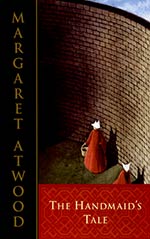
![]() Sable Aradia
Sable Aradia
1/30/2016
![]()
Two days and one hundred years ago, women first achieved the right to vote in Canada. This was in the Manitoba provincial election; the federal government followed two years later. So it is perhaps fitting that the day before is the day I finally chose to start reading "The Handmaid's Tale."
I've been a feminist and a science fiction fan since childhood, so many people have recommended this book to me over the years. The year it was published, 1986, I was eleven. I think someone first recommended it to me in 1991, when I was protesting the Gulf War. I always meant to read it. It was "on my list," especially as a Canadian. Margaret Atwood is considered to be one of the most significant Canadian writers and "The Handmaid's Tale" is a feminist icon.
I was not inspired to read it because of the centennial of women's suffrage in Canada. I was finally inspired to read it because I am doing some science fiction related reading challenges; one to read new-to-me female authors, and the other to read LGBTQ related speculative fiction. "The Handmaid's Tale" was both on a list of award-winning speculative fiction by female authors, and a list of award-winning LGBTQ speculative fiction. You can find those lists at https://www.worldswithoutend.com/list... and https://www.worldswithoutend.com/list... respectively. Because I'm intending to read a lot of books this year, it was convenient for me that this book, which I meant to read someday anyway, was on both lists.
Let's just establish, right off the bat, that I think this is an absolutely stunning book. I am glad I waited so long, because I don't think I would have been mature enough to understand a lot of it until this point in my life. And I have mixed feelings about it. It's frustrating and disturbing. Atwood has made some statements about it that make me angry. Some of the things critics have said about it make me want to beat my head against a wall. It can be difficult to follow if you're not used to the style, because it is written in a flow-of-consciousness perspective that changes back and forth between present and past tense. Some have criticized her for this but I'm sure it was deliberate. The epilogue of the book, a fictional history lecture, says that the story was found recorded over some secular music cassette tapes from the 1980s, usually after a few minutes of music have played. So when you read it, picture a woman about forty, maybe forty-five, telling a story in a tired voice that is sometimes deliberately neutral, sometimes choking back tears and other times choking back rage. Listen to her talk; don't read it expecting standard writing conventions. Perhaps, if you've ever heard a woman telling her tale in an interview for the Shoah project, picture her voice sounding like that.
So, yes. Mixed feelings. On the other hand, I chewed through this book in two and a half very busy days, abandoning all my other reading projects after leafing through the first ten pages. I was riveted to the edge of my seat. Would the protagonist live? Would she die? The whole novel was like holding my breath, waiting for what comes next. If Atwood intended us to feel this way -- waiting in desperate anxiety -- because that was what the protagonist's life was like, then she succeeded admirably. The suspense was downright torturous. Also, the message... the message... How subversive. How frightening. What a fantastic wake-up call in so many different ways, and not just in how it pertains to women.
You can read the rest of my review on Goodreads if you're interested because the software here just won't do it; it's too long. Here's the link: https://www.goodreads.com/review/show/1527396009